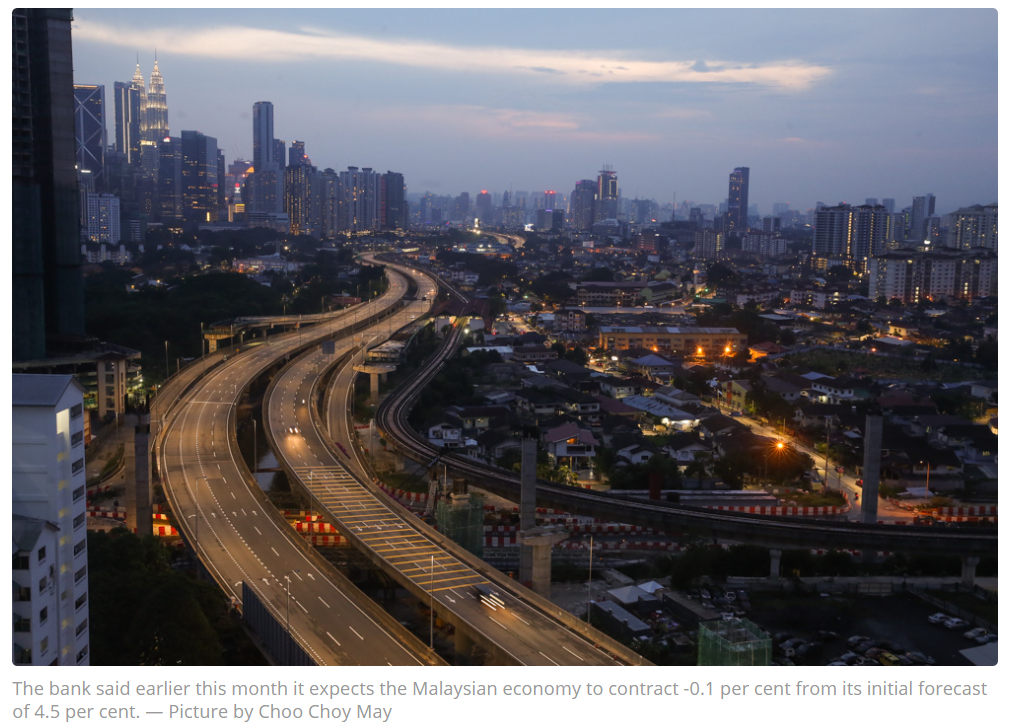World Bank: Malaysia has little space for fiscal response if Covid-19 fallout drags on
KUALA LUMPUR, April 22 — The World Bank has cautioned the Malaysian government about its inability to respond effectively should the Covid-19 fallout drag on, citing Putrajaya’s limited fiscal space for extended intervention.
South-east Asia’s third-largest economy is already struggling to shield its workforce and small businesses from the devastation wrought by the Sars-CoV-2 pandemic.
The bank warned that protracted restrictions could do more damage, given the little monetary options left for the government to extend help, even as the Muhyiddin administration injected a RM260 billion stimulus to retain jobs and keep businesses afloat.
“The large degree of uncertainty over the outcome of the outbreak presents a major downside risk to the economy,” it said in its spring macro poverty outlook.
“The other major challenge is the limited fiscal policy space to respond to the crisis.
“While the recently announced stimulus package could help to mitigate the immediate impact of the outbreak, a deeper economic policy response would be needed should the health crisis deepen and result in a longer duration of economic disruption.”
Over 40 per cent of the country’s 16 million workers are already left out of existing employment social protection, the bank noted.
Perikatan Nasional allocated less than RM30 billion for direct fiscal injection from the total stimulus packages, with most of it as cash handouts channelled towards low- and middle-income households with a monthly income of less than RM4,000.
But the World Bank suggested that more would be needed to protect vulnerable households and businesses should the crisis deepen.
The government has already extended the movement control order (MCO) for over a month, and so far has yet to indicate if the restrictions enforced since March 18 would be gradually lifted once the third phase ends on April 28.
Economists estimate losses from the shutdown to be at least 25 per cent of GDP.
The fallout from the pandemic has prompted Putrajaya to revise its 2020 GDP growth forecast between -2 and 0.5 per cent, in line with the World Bank’s forecast.
The bank said earlier this month it expects the Malaysian economy to contract -0.1 per cent from its initial forecast of 4.5 per cent.
The marked reduction takes into account both the slowing growth in momentum from the second half of 2019 and the outbreak’s impact in a scenario where large-scale disruptions of economic activities extend for most of the year.
A partial recovery is only expected towards the year end, the bank said.
“It is important to note that this estimate has a large degree of uncertainty, conditional on the rapid developments of the outbreak domestically and globally, and the subsequent policy responses,” the report said.
And as global oil prices hit record lows, there is mounting concern that the dip in government revenue would prevent future intervention.
“More targeted fiscal policy interventions would be needed to help mitigate the impact of the crisis on vulnerable households and businesses, as well as increase public health capacity,” the bank said.
“This is further complicated by the plunge in commodity prices which would put additional strain on fiscal space and in turn may increase the burden on monetary policy as a key policy tool.”
Brent crude futures, a global oil benchmark, tumbled 25 per cent to US$19 per barrel today. Brent prices have plunged by more than 70 per cent this year.
Source: https://www.malaymail.com/news/malaysia/2020/04/22/world-bank-malaysia-has-little-space-for-fiscal-response-if-covid-19-fallou/1859106


 English
English




